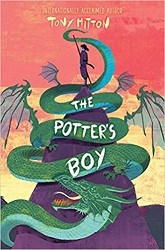
 The Potter's Boy
The Potter's BoyReview posted February 4, 2020.
David Fickling Books, 2019. First published in the United Kingdom in 2017. 246 pages.
Starred Review
Review written October 16, 2019, from a library book
2019 Sonderbooks Stand-out: #8 in Children's Fiction
The Potter’s Boy surprised me by its loveliness and its wisdom. I read it quickly, trying to decide before the deadline which book to nominate for a Cybils Award, and ended up wishing I’d had time to slowly absorb its contents and pull out wise quotations from it.
There’s a dragon on the cover, but I’m not quite sure it’s a fantasy book. There is an episode with a dragon, but that part may well be a dream or vision. Most of the book is a roughly historical tale set in a country similar to ancient Japan.
Ryo, our hero, is the son of a potter who loves his work, and Ryo is apprenticed to him. But one day, brigands attack their village, and a traveler defeats and confounds the brigands. Ryo asks the traveler to teach him to fight like that. The traveler tells him to wait a year, until he is thirteen, and then to seek the Hermit on Cold Mountain.
The book tells the story of Ryo’s journey when he does, in fact, go to the Hermit on Cold Mountain to be trained. So it’s an educating-a-young-person story, but this one takes some surprising turns.
All along the way, Ryo is trained in mindfulness and even nonviolence (which seems surprising for a fighter). It isn’t identified as Buddhism until the author’s note in the back, though some Japanese terms are used in the teaching.
But it’s all so lovely. A compelling story of a young person’s journey and coming of age – but also full of wisdom.
Just a warning -- there is a terrible tragedy in the second half of the book. How Ryo deals with that tragedy is where this becomes not a typical fantasy tale. But please don’t expect all sweetness and light.
There were plenty of wise quotations in this book, and here’s an example:
The important thing is to live and to love, and, if possible, where possible, to make something good from time to time. It may be something you can see and touch and hold on to, like a pot or a fine garment or a painting. Or it may be something more ephemeral, such as good food, which is made and gone in a short space of time. Or it may simply be the art the skill, the knack, of making people happy, or cheerful or at their ease.
It does not matter so much what it turns out to be, but I urge you, if you are reading this, whoever you are, to ask yourself, "What do I make or do that is good, that brings beauty, pleasure, or happiness into the world?" And if you can find no answer to that, seek inside yourself to find the seed, the grain, of something that might fulfill that purpose. We cannot all be great artists or musicians, scientists or storytellers. We cannot reckon to be the best at what we do. But we can, each one of us, look inside ourselves to find a leaning, a direction, that suggests to us how we might make something of worth, while we are here. Is this not true?
An uplifting story of finding one’s calling.
